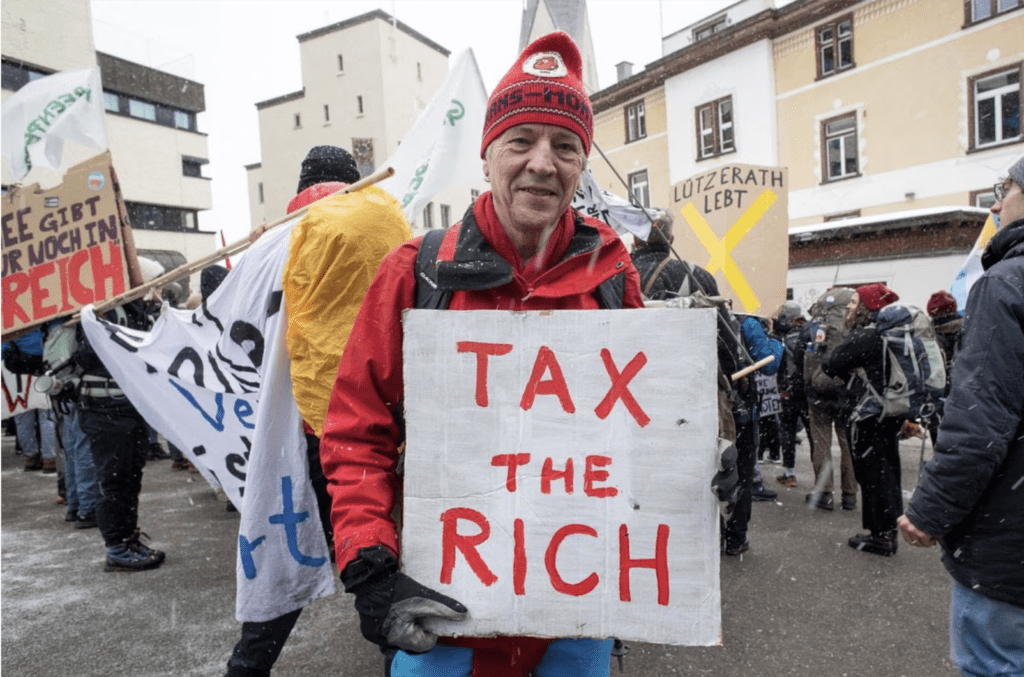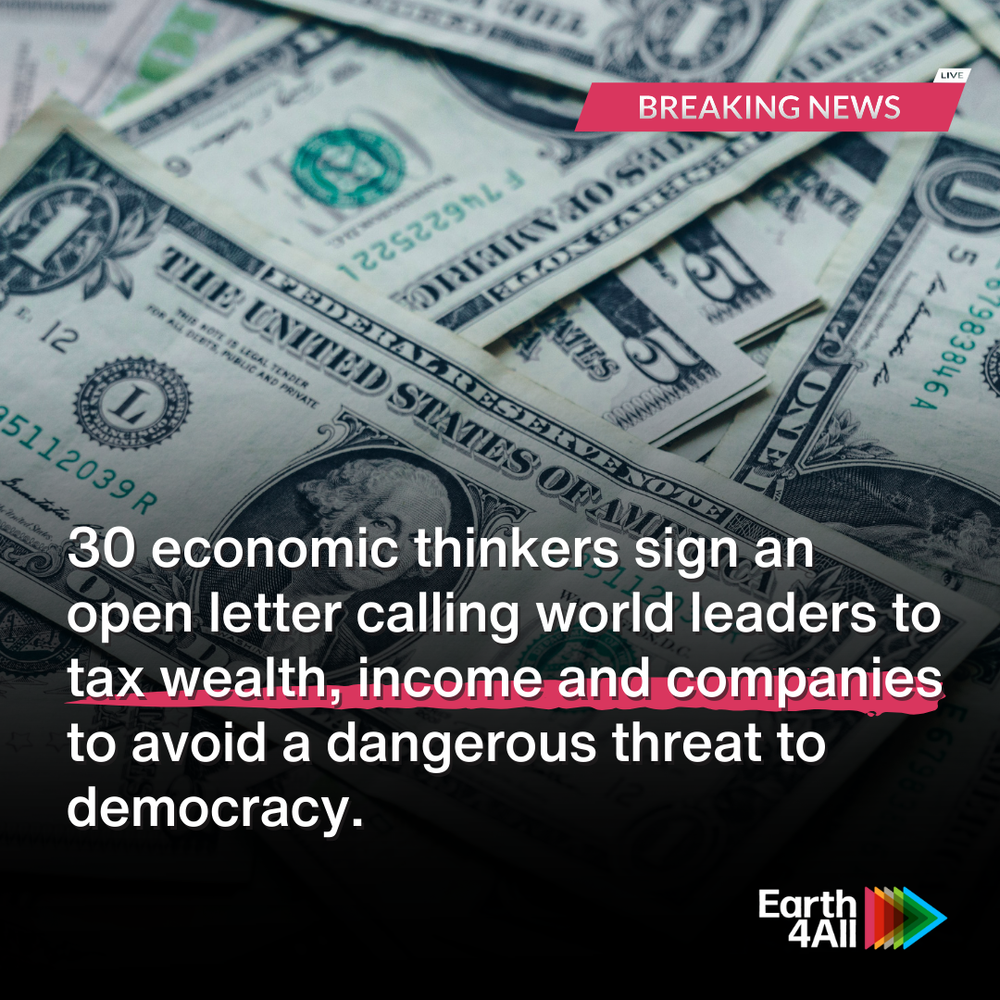
A climate activist displays a placard during a protest ahead of the World Economic Forum (WEF) 2023 in the Alpine resort of Davos, Switzerland, January 15, 2023. REUTERS/Arnd Wiegmann
Exxon Mobil has just announced it made $56 billion in profits in 2022, smashing not only its previous record of $45.2 billion in 2008, but setting a historic high for the Western oil industry. Chevron reported record profits of $35.5 billion last week, while Shell, BP and Total are all expected to follow suit in the next week or so, profiting mightily from the war in Ukraine and the energy crisis.
The rich ‒ individuals and big corporations ‒ have rarely had it so good, while extreme poverty has increased for the first time in 25 years. This growing inequality is a threat to democracy the world over. Either we tax the very rich properly or sit back and watch society fall apart at the seams. As some attendees at the World Economic Forum’s annual meeting in Davos earlier this month made clear, such flagrant inequality will make it nigh on impossible to manage the world’s most pressing problems, not least climate change.
The oil and gas companies are perhaps the most flagrant example of our upside-down world. Despite being responsible for the majority of the emissions that cause climate change, they continue to make higher and higher profits. At the same time, vulnerable people in the lowest income countries, who have done the least to cause climate change and are most impacted by the extreme weather events caused by a warming world, are getting poorer.
Just before Davos, 30 world-leading economists and economic thinkers from 16 countries signed an open letter calling on world leaders to take bold steps to tax wealth, income and companies to avoid a dangerous threat to democracy. The Transformational Economics Commission of the Earth4All initiative, which I co-chair, concludes that, left unchecked, wealth and income inequality will continue to grow, with devastating consequences. Rising social tensions and unrest are likely to become the norm as the chasm between the super-rich and the rest of society balloons.
The commission includes a host of leading thinkers from around the globe, including Janez Potocnik, former EU commissioner and now co-chair of the International Resource Panel; Kate Raworth, author of the groundbreaking doughnut economics theory; Sharan Burrow, former secretary general of the International Trade Union Confederation; and Jayati Ghosh, professor at the University of Massachusetts Amherst.
They want to see a new social contract that ends the unfettered, directionless growth that has become the hallmark of modern society. Instead, this new contract would engender fairer wealth and income distribution to reduce social tensions, improve wellbeing for all and make democracies more stable and resilient against the many challenges they face.
This transformation would include a progressive tax on the income and wealth of the richest individuals and corporations so that by 2030 the wealthiest 10% in all countries receive less than 40% of national incomes. Governments everywhere should apply minimum global tax on companies close to the global average rate of 25%.
Likewise, multinational corporations should be subject to the same rates as domestic companies through the introduction of unitary taxation of their global profits on the basis of individual country shares of sales, employment and assets held in each country. The revenue from these taxes should then be redirected by governments to help enable a just transition towards a well-being economy.
Given the results of companies like Chevron and other multinationals, there is absolutely no reason not to tax windfall profits in all sectors, in particular when they have been made during periods of scarcity and speculation when the rest of the world is worse off. Ending tax incentives and subsidies for fossil fuels is simply a no-brainer in a world where climate change is already costing untold financial and human losses every year. In the U.S. alone climate disasters are estimated to have cost the country at least $165 billion in 2022.
Raising tax levels is unpopular and discussions around it are virtually taboo in many countries. Yet, without cash in the till, inequality will rise and plans to manage the biggest problems of our time, from climate change to poverty, will remain simply words.
Writers from Angela Carter to Margaret Atwood and Philip Pullman have described societies where people are divided into two distinct groups. If we don’t act now to end the growing inequality gap, the world faces the real risk of fictional dystopias becoming earthly realities – the rich in their protected bubble world and the rest of humanity becoming poorer and more affected by the impacts of climate change and food and energy insecurity.
The main headline out of Davos was not a call for high taxes and a new economic model. Indeed, many business leaders doubtless feel that such a strategy would be against their short-term corporate and individual interests. But the current system cannot hold, and there is a rising tide of business leaders and wealthy individuals who made it clear in Switzerland that they understand that economic stability and democracy are at stake and that they are ready to play their part.
The Patriotic Millionaires, a group of 205 millionaires and billionaires, called at Davos for world leaders and business executives to urgently introduce wealth taxes to help tackle “extreme inequality”. In an open letter, they said the meeting of the “global elite” to discuss “cooperation in a fragmented world” was pointless unless the root cause of division was challenged.
“Defending democracy and building cooperation requires action to build fairer economies right now – it is not a problem that can be left for our children to fix,” they wrote. “Now is the time to tackle extreme wealth; now is the time to tax the ultra-rich.”
Governments must be much bolder and more confident, take up this challenge, champion this agenda and make businesses a positive force for democracy, stability, and the long-term future of humanity.

